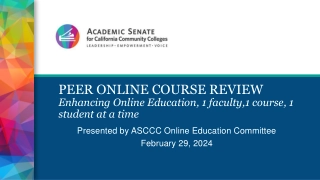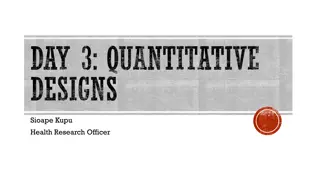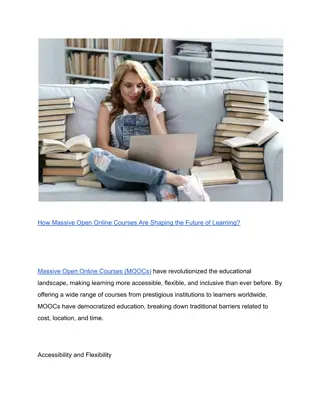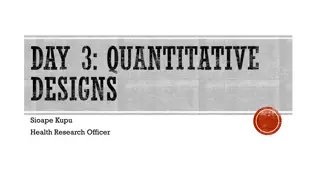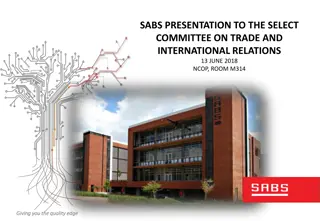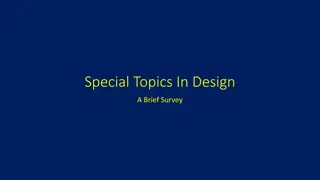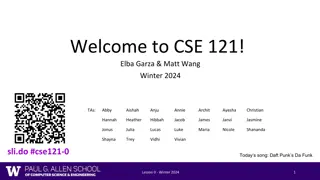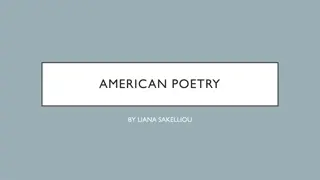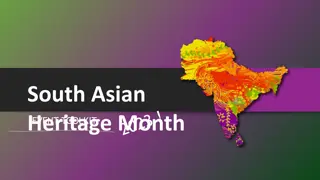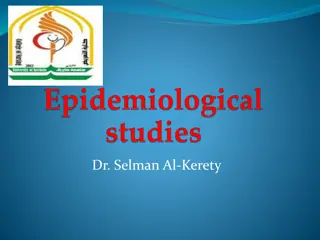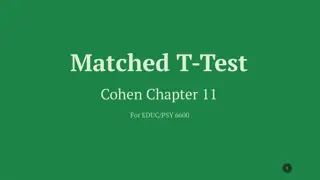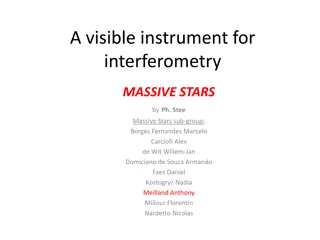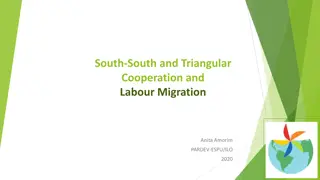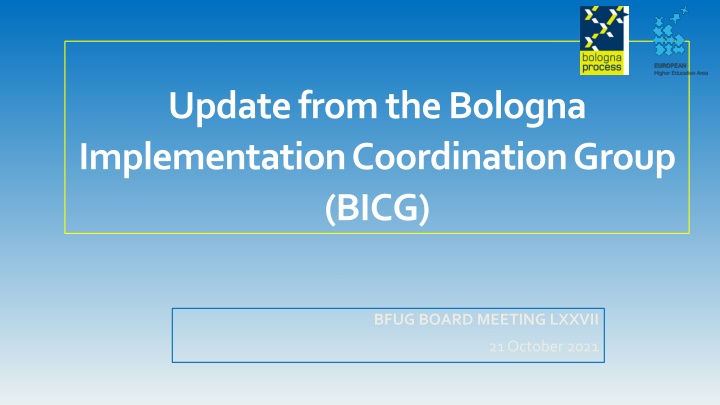
Investigating South American Massive Open Online Course Instructors Designs Supporting Self-Directed Learning
This study delves into how instructors design South American MOOCs to support self-directed learning, exploring the impact and challenges in this evolving educational landscape. It reviews literature on self-directed learning models and the role of motivation in MOOCs, shedding light on key aspects of SDL in online learning environments.
Download Presentation

Please find below an Image/Link to download the presentation.
The content on the website is provided AS IS for your information and personal use only. It may not be sold, licensed, or shared on other websites without obtaining consent from the author. If you encounter any issues during the download, it is possible that the publisher has removed the file from their server.
You are allowed to download the files provided on this website for personal or commercial use, subject to the condition that they are used lawfully. All files are the property of their respective owners.
The content on the website is provided AS IS for your information and personal use only. It may not be sold, licensed, or shared on other websites without obtaining consent from the author.
E N D
Presentation Transcript
Update from the Bologna Implementation Coordination Group (BICG) BFUG BOARD MEETING LXXVII 21 October 2021
COMPOSITION (2021-2024) Co-chairs Austria Bulgaria Italy The Members (6 + the 3 TPGs Co-chairs and the Monitoring WG) BICG Albania; Austria; Bulgaria; European Commission; Italy; EUA -European University Association; EURASHE; one Co-chair of Thematic Peer Group A on Qualifications Framework; one Co-chair of Thematic Peer Group B on the Lisbon Recognition Convention; one Co-chair of Thematic Peer Group C on Quality Assurance; one Co-chair of Working Group on Monitoring the Implementation of the Bologna Process. The BICG is composed in a way representing the diversity of the EHEA with ensured balance of expertise across all key commitments.
Terms of Reference for the BICG Name of the Working Group Contact persons Composition Purpose and/or outcome The Reference to the Rome Communiqu Specific tasks BICG Reporting Meeting schedule Liaison with other WGs and/or advisory groups activities Additional remarks on the Thematic Peer Groups (TPGs) http://ehea.info/Upload/BICG_PT_AD_ToRs.pdf
Terms of Reference for the BICG Purpose and/or outcome The purpose of the BICG is to facilitate a coordinated implementation of the three Key Commitments. To achieve that, the BICG coordinates the work of the TPGs, and facilitates an exchange of experience and best practice between the TPGs. The BICG follows the peer support activities and reports to the BFUG on overall progress and any necessary revisionofthepeer support approachormethodology. The BICG The activities should build upon the workandthe results/achievements of the BICG in the period 2018-2020 and the outcomes of and recommendations for the work of the TPGs presented in the BICG Report. http://ehea.info/Upload/BICG_PT_AD_ToRs.pdf
Terms of Reference for the BICG Specific tasks Coordinatethe work of the TPGs; Follow-up peer support activities by keeping an overview of the composition and activities of the different groups; Seek to improve the Peer Support Approach for the implementation of the Key Commitments, including possible adjustments; Identify synergies in the work of the Thematic Peer Groups; Give the BFUG regular updates and an overview on the progress and effectiveness of the Peer Support Approach for the implementation of the Key Commitments, based on the activities of the TPGs; Prepare analytical reports to the BFUG on the activities of the different TPGs and the support for the implementation of Key Commitments as a whole, including operation (what works, what doesn t work), impact and usefulness; Prepare recommendations for further actions to improve implementation for consideration by the BFUG; Provide an assessment of the usefulness of thematic peer groups as a working method, including whether they should be extended to other policy areas within the competence of the BFUG. The BICG http://ehea.info/Upload/BICG_PT_AD_ToRs.pdf
1. First Meeting of the BICG, 10 May 2021, online - The 2021-2024 Work Plan (Terms of Reference, deliverables and meeting schedule); - The draft Guidelines for the TPGs; - Status Quo of Implementation of KCs; - The European Commission support for TPGs under the Erasmus+ Program; - Next steps. The http://ehea.info/Upload/BICG%20_PT_AD_1_Agenda.pdf 2. Second Meeting of the BICG, 1 October 2021, online BICG - Updates from the Secretariat, the BICG Co-chairs and the TPGs Co-chairs; - Umbrella Projects, EC support; - Work Plans of TPGs /discussion of Templates for Work Plans/. http://ehea.info/Upload/BICG_SI_AM_2_Agenda.pdf 3. Third Meeting of the BICG, 21 January 2022, online Regular pre-meetings of the Co-chairs are also held.
3 Thematic Peer Groups Established compositions and structures including the terms of references and the guidelines The Thematic Peer Groups /TPGs/ /only one country has not confirmed its participation in any of the TPGs/ First meetings held Umbrella projects submitted Work plans by the end of October 2021 Countries work plans by January 2022
Co-chairs Austria Georgia Latvia TPG A on Qualifications Framework Members 34 29 countries: Albania, Andorra, Armenia, Austria, Azerbaijan, Belarus, Belgium /Flemish Community/, Bulgaria, Croatia, Cyprus, Czech Republic, Estonia, Georgia, Germany, Greece, Hungary, Italy, Kazakhstan, Latvia, Malta, The Netherlands, North Macedonia, Poland, Romania, Russia, San Marino,Spain,Turkey,UnitedKingdom/Scotland. 5organisations: CouncilofEurope,EI-ETUCE,ESU,EURASHE,European Commission
Specific thematic indications include: Self-certificationof the national qualification frameworks to the overarching Qualifications Framework of the EHEA; Complete implementation of the ECTS Users Guide; Short cyclehigher education; Multiple purposes and use of the qualifications frameworks by the stakeholders; Study programmesoutside of the Bologna three-cycle structure; Relationshipbetween the qualifications frameworks and quality assurance. TPG A on Qualifications Framework First Meeting of the TPG A on QF, 7 June 2021, online Second Meeting of TPG A on QF, 4 November 2021, online http://ehea.info/page-peer-group-A-QF
Co-chairs Albania France Italy TPG B on the Lisbon Recognition Convention Members - 46 38 countries: Albania, Armenia, Austria, Azerbaijan, Belarus, Belgium /Flemish Community/, Bulgaria, Croatia, Cyprus, Czech Republic, Denmark, Estonia, France, Georgia, Germany, Greece, Holy See, Hungary, Ireland, Italy, Kazakhstan, Latvia, Lithuania, Malta, ldova, The Netherlands, North Macedonia, Norway, Poland, Portugal, Romania; Russia, San Marino, Spain, Sweden, Switzerland,Ukraine,UnitedKingdom 8 organisations: Council of Europe, EI-ETUCE, EQAR, ESU, EUA, EURASHE, EuropeanCommission,UNESCO
Specific thematic indications include: Establishing the legal framework to allow the implementation of the LRC; Establishing the distribution of work and responsibilities among the competent institutions that have the right knowledge and capacity to carry out recognition procedures; TPG B on the Lisbon Recognition Convention Achieving automatic recognition; Recognition of alternative pathways; Qualifications held by refugees; Optimisingthe potential of digital technology for the recognition agenda and the Diploma Supplement. First Meeting of the TPG B on LRC, 14 September 2021, online http://ehea.info/page-peer-group-B-LRC
Co-chairs Belgium/Flemish Community Romania Kazakhstan TPG C on Quality Assurance Members 49 42 countries: Albania, Armenia, Austria, Azerbaijan, Belarus, Belgium /Flemish Community/, Bosna and Herzegovina, Bulgaria, Croatia, Cyprus, Czech Republic, Finland, France, Georgia, Germany, Greece, Holy See, Hungary, Iceland, Ireland, Italy, Kazakhstan, Latvia, Liechtenstein, Lithuania, Luxembourg, Malta, Moldova, the Netherlands, North Macedonia, Norway, Poland, Romania, Russia, San Marino, Slovak Republic,Slovenia,Spain,Sweden,Switzerland,Ukraine,UK Scotland 7 organisations: EI-ETUCE, ENQA, EQAR, ESU, EUA, EURASHE, EuropeanCommission
Specific thematic indications include: Legislative framework in line with the ESG; Internal quality assurance; TPG C on Quality Assurance Enhancement-oriented use of the ESG; Cross-border QA; The European Approach to the QA of joint programmes. First Meeting of the TPG C on QA, 30 June 2021, online http://ehea.info/page-peer-group-C-QA
TPG A on QF The main aim to provide the EHEA member states with opportunities for peer learning and exchange of best practices by organizing various PLA activities and working groups. The project will focus on activities TPG A on the Qualifications Framework, which supports the Key Commitment 1 (a three-cycle system compatible with the overarching Qualifications Framework of the EHEA and first and second cycle degrees scaled by ECTS). The umbrella projects Erasmus+ support The project builds on themes that have been identified as priorities within the TPG A on QF. The topics covered will be the Implementation of the Qualifications Frameworks and ECTS, focusing on learning outcomes, the assessment of learning outcomes on programme level, Self-certification, as well as one of the key topics at European level regarding the implementationofmicro-credentialswithinthecontext ofQF. 3 working groups will be established with an aim to encourage in-depth discussions in order to provide specific recommendations on various QF- related topics (Self-certification, Short cycle higher education, as well as micro-credentials).
TPG B on LRC The main aim supporting the implementation of the Bologna Process focusing on the key commitment 2 on national legislation and procedures compliant with the Lisbon Recognition Convention in the countries that arepartoftheThematicPeerGroupB. The umbrella projects Erasmus+ support Work packages WP1. Support to the organization of the TPG B meetings WP2. Organisationof public seminars WP3. Research and publications WP4. Peer support activities Transversal WPs:WP5. Quality Assurance and WP6. Dissemination and sustainability
TPG C on QA The main aim supporting the implementation of the Bologna Process focusing on the key commitment 3 on the Quality Assuramce in the countries thatarepart oftheThematicPeerGroupC. The umbrella projects Erasmus+ support Work packages Overall management Organisation of TPG meetings Staff mobility programme PLA(3) 3 thematic WPs: QA of Micro-credentials (ENQA), QA of European Universities, Digitalisationof QA processes
Creating opportunities The Erasmus+ EHEA reforms call Establishing barriers Raising questions

